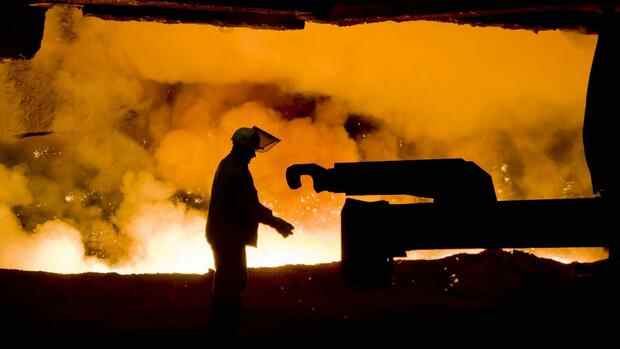The steel industry is facing multi-billion dollar investments due to the pressure to reduce its carbon emissions.
(Photo: imago images/simme)
Dusseldorf The start of the new year could hardly have gone better for Thyssen-Krupp’s steel division: Despite weakening demand from the automotive industry, the Essen-based industrial group’s traditional business posted adjusted earnings before interest, taxes, depreciation and amortization of 479 million euros between January and March best result in recent history.
Nevertheless, the CEO of Thyssen-Krupp Steel, Bernhard Osburg, is concerned about the future. Because the fear that the war in Ukraine could lead to an interruption in German gas supplies weighs heavily at the Duisburg location. “If we can cover less than 50 percent of our current gas requirements, it will be difficult to maintain stable production,” he said in an interview with the Handelsblatt.
For the group, this means a high risk – also because many systems are designed for continuous operation. “A coking plant, for example, cannot be shut down at short notice without causing major economic damage,” says Osburg.
Like many other companies from the energy-intensive industry, Thyssen-Krupp is therefore running through various scenarios so that it can react quickly to a changed supply situation in an emergency.
Top jobs of the day
Find the best jobs now and
be notified by email.
A possible gas delivery stop as a result of the Ukraine war is just one of the many uncertainties that the Ruhr group is currently having to come to terms with. A few weeks ago, the group’s board of directors in Essen had therefore put “Project Freedom” on hold, as part of which the steel division, long Thyssen-Krupp’s core business, was to be spun off from the group.
No more cross-financing
It is perhaps the most important step in the restructuring of the former industrial conglomerate, which CEO Martina Merz wants to convert into a lean group of companies with independent units. In the past it was common for profitable divisions to counter-finance the losses in other business areas, but in future the subsidiaries are to largely finance themselves.
In the case of steel, however, it is unclear to what extent this is possible. Because the steel industry is facing billions in investments due to the pressure to reduce its CO2 emissions. Thyssen-Krupp alone is expecting an amount in the high single-digit billions to gradually replace the blast furnaces in Duisburg with direct reduction plants and electric arc furnaces.
Employee representatives and management have been arguing for a long time about how high the dowry must be with which the steel division can be released into independence. From the point of view of IG Metall, the subsidiary needs a capital grant of 3.2 billion euros in order to be able to make the necessary investments. The group in Essen, on the other hand, sees the capital requirement at around 700 million euros, the “Manager Magazin” recently reported.
Hope for state participation is fading
IG Metall had high hopes for the North Rhine-Westphalian state elections after SPD candidate Thomas Kutschaty had already spoken out in favor of state participation in the steel division. But after the election victory of the CDU, such an entry seems unrealistic – which is why the steelmakers will probably be left to their own devices if a traffic light coalition is not formed after all.
How much capital is actually required will depend on how long the price-related steel boom will last. Analysts like Bastian Synagowitz from Deutsche Bank consider it possible that Thyssen-Krupp could raise its earnings targets again in the second half of the year. Carsten Riek from the Swiss bank Credit Suisse emphasizes that the group is also benefiting from rising capital market returns because the high pension costs, which amount to around four billion euros for Stahl, are now valued lower.
Employees also admit that business is doing better than assumed at the beginning of the year. “The business figures for the first half of the year make me confident that the feared effects of the Ukraine war will not materialize,” said the head of the steel division’s works council, Tekin Nasikkol, at a press conference on Monday. The short-time work that Thyssen-Krupp had registered as a result of the war would decrease. “That gives us momentum for the rest of the year.”
More: Thyssenkrupp Marine Systems wants to form German shipyard champion

